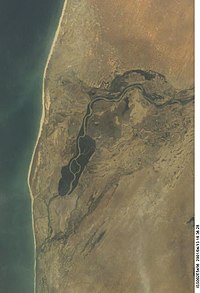Mauritania-Senegal Border War
| Mauritania–Senegal Border War | |||||||
|---|---|---|---|---|---|---|---|
 NASA image of the Senegal River valley: Mauritania is located to the north and Senegal is located to south. |
|||||||
|
|||||||
| Belligerents | |||||||
|
|
|
||||||
| Commanders and leaders | |||||||
|
|
|
||||||
| Strength | |||||||
| 10,000 | 14,000 | ||||||
| Casualties and losses | |||||||
| Hundreds dead | Hundreds dead | ||||||
| 250,000 displaced | |||||||
The Mauritania–Senegal Border War was a conflict fought between the West African countries of Mauritania and Senegal during 1989–1991. The conflict began around disputes over the two countries' River Senegal border and grazing rights, and resulted in the rupture of diplomatic relations between the two countries for several years, the creation of thousands of refugees from both sides, as well as having a significant impact on domestic Senegalese politics.
Mauritania's south is mostly populated by the Fula/Toucouleur, Wolof, and Soninké. Senegal, meanwhile, is dominated by the Wolof.
The Senegal River basin between Mauritania and Senegal has for centuries been inhabited by both black populations, such as the Fula/Toucouleur, Wolof, Bambara, and Soninké, and by Arabs and Berber peoples. Periods of drought throughout the 1980s increased tensions over available arable land, with the basin becoming even more important because of development of the basin by the Organisation pour la mise en valeur du fleuve Sénégal (Senegal River Basin Development Authority), which constructed dams, such as the one at Djama, that altered the balance between herders and farmers by opening new parts of the valley to irrigation. Mauritania's attempts at land reform in 1983 strengthened the role of the state while undermining traditional agriculture, making more acute the problem of many farmers on both sides of the border. Both Mauritania and Senegal are former French colonies; however, since its independence, Mauritania has sought to reinforce its Arab identity, including the strengthening of ties with the Arab world. Senegal, in comparison, remained attached to the Organisation internationale de la Francophonie, resulting in increasingly divergent foreign policies in the two countries.
...
Wikipedia
